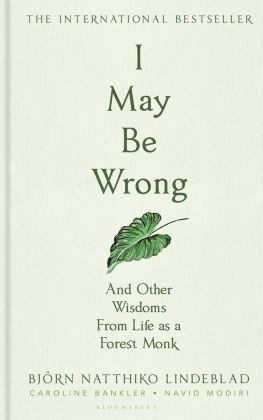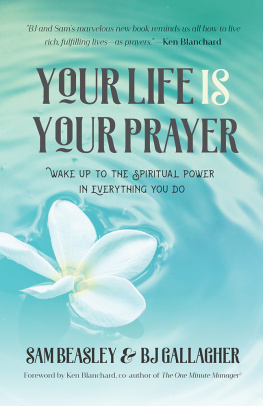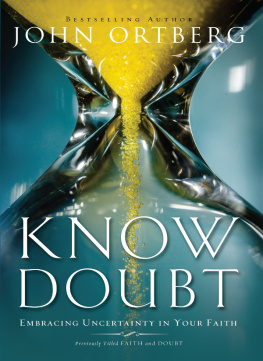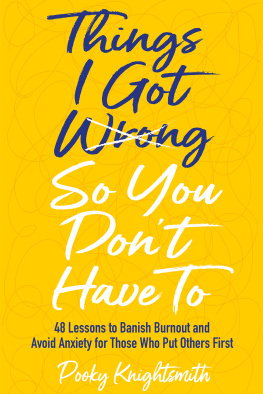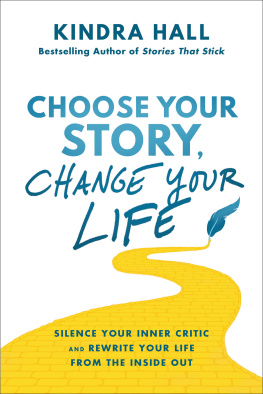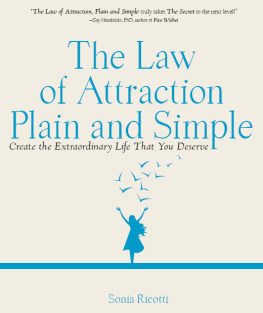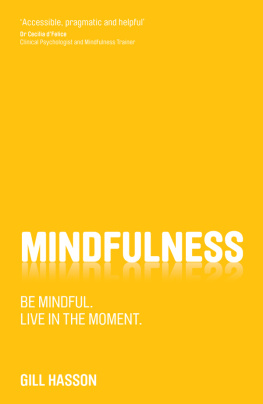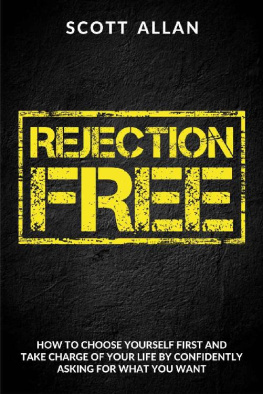
I May Be Wrong

BLOOMSBURY PUBLISHING
Bloomsbury Publishing Plc
50 Bedford Square, London, WC1B 3DP, UK
29 Earlsfort Terrace, Dublin 2, Ireland
BLOOMSBURY, BLOOMSBURY PUBLISHING and the Diana logo are trademarks of Bloomsbury Publishing Plc
First published in 2020 in Sweden as Jag kan ha fel by Bonnier Fakta
First published in Great Britain 2022
This electronic edition first published in 2022
Copyright Bjrn Natthiko Lindeblad, Caroline Bankler & Navid Modiri, 2022
Published by agreement with Salomonsson Agency
Bjrn Natthiko Lindeblad has asserted his right under the Copyright, Designs and Patents Act, 1988, to be identified as Author of this work
For legal purposes the constitute an extension of this copyright page
All rights reserved. No part of this publication may be reproduced or transmitted in any form or by any means, electronic or mechanical, including photocopying, recording, or any information storage or retrieval system, without prior permission in writing from the publishers
Bloomsbury Publishing Plc does not have any control over, or responsibility for, any third-party websites referred to in this book. All internet addresses given in this book were correct at the time of going to press. The author and publisher regret any inconvenience caused if addresses have changed or sites have ceased to exist, but can accept no responsibility for any such changes
A catalogue record for this book is available from the British Library
ISBN: HB: 978-1-5266-4482-4; TPB: 978-1-5266-4481-7;
eBook: 978-1-5266-4480-0; EPDF: 978-1-5266-4479-4
To find out more about our authors and books visit www.bloomsbury.com and sign up for our newsletters
Contents
After leaving my life as a monk behind and returning to Sweden, I was interviewed by a newspaper. They wanted to know more about my somewhat unusual life choices. Why would a successful businessman give away everything he owns, shave his head and go off into the jungle to live with a bunch of strangers? Some way into our conversation, the interviewer asked the million-dollar question:
What is the most important thing you learned during your seventeen years as a Buddhist forest monk?
The question made me feel nervous and flustered. I had to say something, but I didnt want to rush this particular answer.
The journalist sitting across from me wasnt a person of any discernible spiritual interest. He had no doubt been shocked to learn about all the things Id chosen to forego during my time as a monk. After all, Id lived without money, without sex or masturbation, without TV or novels, without alcohol, without family, without holidays, without modern conveniences, without choosing when or what to eat.
For seventeen years.
Of my own free will.
And so, what did I get out of it?
It was important to me to be honest. I wanted my response to be the absolute truth as I saw it. So, I looked inward and before long the answer bubbled up from some quiet place inside:
What I value most from my seventeen years of full-time spiritual training is that I no longer believe my every thought.
Thats my superpower.
Whats great about that is that its everyones superpower. Yours, too. If youve lost sight of it, I hope I can help to guide you along the path to rediscovering it.
Its a tremendous privilege to have had so many opportunities to share what I learned during my years of continual effort to achieve spiritual and personal growth. Ive always found those opportunities deeply meaningful. Ive been given so many things that have helped me, that have made my life easier to live, made it easier to be me. If Im lucky, you will find something in this book that can help you. Some of these insights have been pivotal to me. Not least in the past two years, when Ive found myself in Deaths waiting room earlier than I would have wished. Perhaps this is where it ends. But perhaps its also where it begins.
Im eight years old. As usual, Im the first to wake. I pace around my grandparents house on an island on the outskirts of Karlskrona, south-east Sweden, waiting for my younger brother Nils to wake up. I pause at the kitchen window. Suddenly, the noise inside me falls silent.
Everything goes quiet. The chrome toaster on the windowsill is so beautiful I skip a breath. Time stops. Everything seems to shimmer. A couple of clouds smile down from a pale morning sky. The birch tree outside the window waves its glittering leaves. Everywhere I look, I see beauty.
I probably didnt put my experience into words back then, but I would like to try to now. It was as though the world was whispering: Welcome home . For the first time, I felt completely at home on this planet. I was present in the here and now, with no thoughts. Then my eyes welled up and I felt a warmth in my chest, which today I would call gratitude . Hard on its heels followed the hope that this feeling would last forever, or at least for a really long time. It didnt, of course. But Ive never forgotten that morning.
I have never felt completely comfortable with the term mindfulness . My mind doesnt feel full when Im truly in the moment. More like a big, empty, welcoming space, with plenty of room for everyone and everything. Conscious presence. It sounds like hard work, the opposite of being relaxed. For that reason, I like to use a different word: awareness .
We become aware, we remain aware, we are aware. It was awareness that blossomed that early morning beside the toaster in Karlskrona. It feels like leaning into something soft. The thoughts, the feelings, the physical sensations everything is allowed to be exactly as it is . It makes us a little bit bigger. We notice things in and around ourselves we havent noticed before. Its an intimate feeling. Like an invisible friend whos always on your side.
Needless to say, your degree of presence affects how you relate to other people. We all know what its like to spend time with someone who isnt present. Theres always this nagging sense that somethings missing. I feel it comes to the fore every time I meet young children. Theyre less than impressed by our analytical skills, but amazingly sensitive as to whether or not we are in the moment. They can tell when were faking or when our thoughts are somewhere else. The same goes for animals. But when were present, when were not hypnotised by every little thought that flashes into our heads, people find us much more pleasant to be around. They give us their trust. They give us their attention. We connect with the world around us in a completely different way. You know this already, of course, and it may sound trite. And yet, many of us forget. Its so easy to become hung up on appearing clever and impressive that we forget just how far sincerity can take us.
I left school with good grades and had my pick of universities, but no clear plan for my future. Taking a fairly casual approach to the whole thing, I applied to a few different degree courses. As it happened, I was in Stockholm that August when the entrance exams for the Stockholm School of Economics were being held. It was the path my dad had chosen: finance, economics, big companies. So I sat the exams, an entire day of demanding tests. Turns out I did well and a few months later I received a letter saying I had got in. Lacking in direction as I was, I reckoned I had nothing to lose by enrolling. Economics is always useful; it opens lots of doors. So Id been told. But the real reason I decided to accept my offer from the Stockholm School of Economics was probably that it made my dad proud.
Next page
